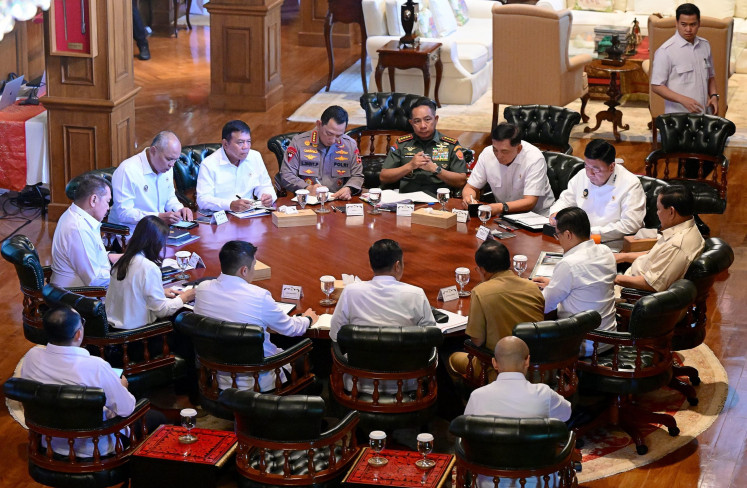Popular Reads
Top Results
Can't find what you're looking for?
View all search resultsPopular Reads
Top Results
Can't find what you're looking for?
View all search resultsPartnerships pivotal for effective development
CCPHI facilitates dialogue among related parties or stakeholders to realize partnership-based initiatives so as to reach the right target
Change text size
Gift Premium Articles
to Anyone
C
CPHI facilitates dialogue among related parties or stakeholders to realize partnership-based initiatives so as to reach the right target.
The first high-level meeting of a global partnership for effective development cooperation (GPEDC) was held in Mexico City in April this year.
Initiated by the United Nations, GPEDC aims to help nations, businesses and organizations to join forces to end poverty. The meeting brought together governments, the private sector, civil society and others to ensure that funding, knowledge and policy can have a maximum impact on development.
The question is how one would bring this initiative to the community level.
The answer is, surely, through a partnership.
By definition, a partnership is an arrangement in which parties agree to cooperate to advance their mutual interests.
A sustainable community through a sustainable partnership is something to be understood better through lessons learned or best practices, some of which have been demonstrated by organizations to improve the livelihood of the communities.
Some models of partnerships have been documented and published, including those written and published on the Company-Community Partnerships for Health in Indonesia (CCPHI) website.
Case studies of partnerships show the dynamics of partnerships between companies and non-governmental organizations (NGOs) or civil society organizations (CSOs) or local government.
Building trust
The key word for successful and sustainable partnership is trust. Therefore, it is very important to build trust among individuals or organizations as the fundamental element to build a sustainable partnership.
In response to the era of globalization, good governance, inclusive business and shared valued are the platforms.
In reaching the objective of creating a sustainable community, the community itself has to be involved in the partnership process, including the implementation of a project or program. Ideally, a partnership involves more than two organizations or institutions. As many say, 'the more, the merrier.'
In the early 1990s, two scholars, Henry Etzkowitz and Loet Leydesdorff, introduced university-government-industry relations, called the Triple Helix concept. It places university as a research and development institution equivalent with industry and government and brings improvements in productivity of a knowledge-based society.
The theoretical framework of the Triple Helix concept is about transforming strategies for developing countries to shape their competitive standings toward a better and sustainable community.
In more recent years, a terminology of collaboration is introduced as public-private partnership, also known as PPP or P3. The World Bank defines PPP as bringing greater efficiency and sustainability to the provision of public services.
It says in its website that the World Bank's PPP is to address two goals that it sets: to eliminate extreme poverty and boost shared prosperity.
PPP is also defined as a business relationship between a private sector company and government agency for the purpose of completing a project that will serve the public.
These two definitions refer more to financing to build infrastructure.
A community development program will be successful and sustainable when it puts the community into center stage as a subject.
Commonly, a partnership program involves stakeholders representing various elements, government, business sectors, NGO/CSOs, academicians and communities that may not be represented by the NGO/CSOs, but by head of the community, such as an informal leader, including religious or adat (customary) leaders.
Each stakeholder has its own interests and resources. Government's interest is to improve the community's welfare; business' is to sustain its business, the NGO/CSO's is to do whatever it is mandated to do.
Meanwhile, an academic's interest is to find the answers to research questions and the community's is to improve its livelihood.
All of the interests can be jointly achieved together through partnership as long as they have a shared vision and that they all have their own resources in various forms, including funding and in-kind, such as technical assistance, products and space.
Case studies of partnerships implemented by two or more organizations or institutions or sectors are tools and references to improved development programs.
These case studies showcase models of partnerships that may be applicable to partnerships on particular programs or projects in a specific area in Indonesia. Case studies are expected to be distributed or accessible to the public and various forms of media, including newspapers, magazines, radio, television and social media.
Most recently, Paramadina University, a private university in Jakarta, initiated an executive education program called the 'Executive Program for Sustainable Partnership' (EPSP). The EPSP is an initiative to respond to the challenges of globalization, referring to Post-Millennium Development Goals 2015 (Post-MDGs 2015), which could be the answer to the question above as to how to bring down the GPEDC to the community level and to understand and implement a sustainable community program under the framework of partnership.
The program aims, among other things, to build trust: a very important, if not the only important value to build sustainable partnerships. This initiative of the executive program is a step toward a graduate school of partnership.
Documented lessons learned and best practices serve as the best tools for the community to understand the phenomena of effective development and to be able to materialize their concept.
(Kemal Soeriawidjaja)










